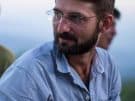
What did you want to be when you were growing up?
I didn't have archaeology in mind at all as a child, although I did rather enjoy digging in my father's garden for old treasure. As a young child I, like many others, wanted to be a fireman and rather more unusually wanted to make sculptures. When I was a bit older I wanted to be a doctor like my father, but he strongly discouraged it; he said it was “just too hard work”.
What first started you on the path to history and archaeology?
It was pure luck. After high school I studied maths. I enjoyed it, it felt like a game to me; puzzles and problems to solve. After two years the fun had gone out of it, however, and I left the course. I had no idea what to do next. My very best friend at the time, Manu Vella, was studying history in Bordeaux. He convinced me to join him and to study the same. I hadn't liked history much before this, and I was surprised when I grew to love it and subsequently did really well on my exams.
During my undergraduate course in history I had to choose between options and I decided to do archaeological fieldwork. I was able to join a dig in the centre of Bordeaux which I found very enjoyable. Whilst there I ended up chatting with a young man. I asked him if he was a student there as well, but it turned out that he was there doing his military service with an archaeological institution. I hadn't known that this was possible, but I contacted the institution and found out how to go about it. So when I finished my master’s degree, that was how I ended up doing my (18 month) military service.
When I finished my service I didn't have any immediate plans and worked for a while as a freelance archaeologist in Bordeaux, bearing in mind that I should define a PhD research subject. Luckily one of my previous professors, Pierre Debord, offered me work through the University. We were going to work on the theatre and agora in Orthosia in South West Turkey.
Towards the end of our stay there, Pierre told me to wander up to look at the city, as I hadn't explored it yet. I took a backpack, had a look around and ended up in the Necropolis. It was amazing, it felt just like I was Indiana Jones. I walked through some bushes, saw a dark opening and climbed through to explore the inside of a burial chamber. It was a really fantastic experience.
When I came back I asked Pierre when we would be studying the Necropolis, but he said it wasn’t part of the plan. We argued back and forth about this for a long time, and in the end he suggested I could take a week holiday and use that to explore the necropolis and write up a report about it when I got back to the university. So that's what I did, and this eventually led me to pursue my PHD in archaeology and to focus on the 6th-2nd centuries BC funerary matters in the Ancient region of Caria in Turkey.
![Exavations at Labranda]() What does your usual working day look like?
What does your usual working day look like?
This depends completely on the time of year. During the fall, winter and spring, my work is office based. We apply for permissions in the fall and December is our deadline. Fall is also the time for conferences, processing reports and applying for money. During the spring we work on publications and we prepare and organise the oncoming digs. I am usually up at 7 and get to work for 8:30 and then I work in the office the whole day.
During the summer I get up around 6:30 and start work at 7:30. As a Director I organise the dig and try to anticipate and prevent problems as we go. I negotiate with the local authorities very frequently to ensure we have the right permissions and deal with any emergencies that pop up along the way. I don't do much digging personally anymore. During my first summer as a Director I ended up digging 3 days out of 7 weeks. But I enjoy being able to visit all the different teams and see what they are up to.
What is your favourite dish from Turkey (Olivier leads tours for us in Turkey as well as Sicily), and why?![Olivier Henry cooking]()
My favourite Turkish dish is Kuzu Tandır (roasted lamb). I am a bit of a meat person, and love the flavour of lamb, but sometimes find that the meat is quite hard. But the way Tandir is cooked leaves the meat wonderfully tender and flavourful. To cook Tandir they dig a big hole in the ground and line it with stones. They build a fire inside so the stones get very hot, then they put the whole lamb in the hole and put a lid on it. The lamb is left to cook for 2 days, after which the meat melts in the mouth. It can be really hard to find, though, as it is obviously a very time consuming dish.
What is the weirdest/yuckiest thing you have ever eaten when travelling?
It is actually a drink I had in the mountains of Caria. I was walking in the interior with a professor and some other students far away from anywhere and we came across this guy who lived on a small farm with his goats. He was very happy and impressed to meet such an educated group of people, and he wanted to give us something to drink. As you can imagine it was impossible to say no, even though we had no idea what he was going to serve us.
We saw him come out of his house carrying glasses with a pinkish liquid inside. Politely, we all took a sip and the professor said "yum - delicious - what is it?". The man said it was Ayran; a traditional Turkish salty yoghurt drink. Well, I hate milk and yoghurt drinks at the best of time, but this one was particularly vile. The professor said "yes - but it is pink". And the man said that he had slaughtered a goat the day before, and he had added some of the blood to the Ayran. This common practice supposedly makes it even better, but we all had great difficulty drinking this, and it is to this day the worst I have ever had.
Which historical person do you most admire and why?
I admire Mausolus, a 4th century BC dynast in Caria, who ruled from Halicarnassus, modern Bodrum, where his tomb, the mausoleum, became noted as one of the seven ancient wonders. At the time Caria consisted of a lot of small villages and towns dotted around with a Dynast in each area. The region was a part of the Persian empire, but there wasn’t really much interaction between Persia and Caria. The Great King of Persia decided that the region of Caria should become a Satrapi.
Usually when he did that, he would send a commander who was close to him from Persia to rule the area, but in this case he instead chose a local man; Mausolus' Dad Hecatomnus, who later passed it to Mausolus. Mausolus' greatest work was to transform this area. At the time of his death it was the largest economy in the region; he had not only developed the economy, and made a huge influence on the infrastructure, but created a unique Carian identity. He was able to create a Carian nation; it was an incredible achievement in 20 years. What I admire most is that he had a vision for his people and he managed to achieve it.
If you were to recommend one book to ignite an interest in history/archaeology, which would it be?
It would be "Mausolus" by Simon Hornblower (1982), not an easy book to get hold of, but it is worth it if you can. Mausolous is beautifully written, a bit like a novel, and it reads really well. I also like that he has collected every shred of evidence he can find, whether it is architectural, ceramic, historical, cultural, archaeological or geological to create this biography of Mausolus.
Do you have an interesting travelling anecdote to share with us?
Just after I had finished my Masters degree, I went to Mycenae in Greece with my girlfriend at the time. It is such a fantastic place so we ended up spending hours there, just with our daypacks, and we completely forgot to keep an eye on the time. Finally, when we were ready to leave, we realised the guardian had closed the doors and we were trapped behind very tall metal fences. We thought we'd have to spend the night there, but in the end we decided to risk life and limb and climbed the 4-5 metre tall fence instead. Outside we realised we had missed all buses and transport from the site as well and had a really long walk to the local village. When we arrived at the village, we were lucky to be able to camp in the house of a local villager before moving on the next day.
What one object could you not live without?![Olivier Henry talking]()
I could not live without a book. Although I am not sure which book it should be; my favourite book changes frequently, but I'd rather be stranded somewhere with a book than anything else.
What is the most important lesson life has taught you?
That something good can come out of even the worst possible scenario if you look hard enough.
Journey with Olivier
If you would like the opportunity to go on tour with Olivier, take a look at our wide range of archaeological tours.
Here is what some of our guests have been telling us about Olivier:
“…Olivier Henry was a total star, his knowledge of the ancient sites and the history surrounding them was utterly compelling, I couldn't believe my eyes or ears sometimes. No question was too silly for him, he was charming, funny, riveting and humble, I adored him.” Katherine Wyld
“Olivier - we love him! You need a box for "Amazing!" James Bennett.
“Olivier was superb. He combined an extraordinary amount of knowledge with a terrific sense of humor”. Carol Mossman.
“Olivier was great and our conversations over dinner really added to the experience.” Jan Tallis.
"Olivier was very passionate, enthusiastic and generous in his sharing of knowledge." Steve Killick.
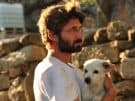
 What does your usual working day look like?
What does your usual working day look like?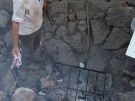
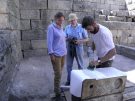
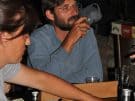
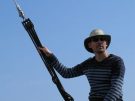

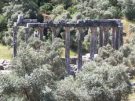
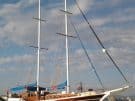
Leave a Reply